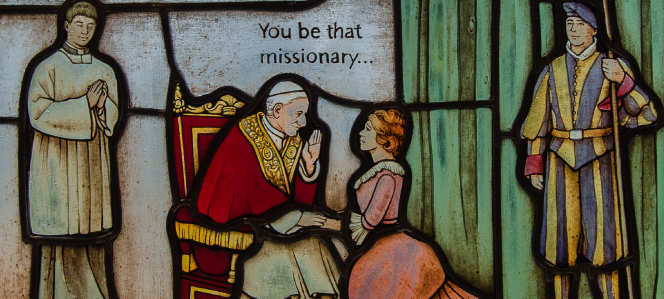On the Feast of St. Katharine Drexel, I share the following excerpt from my book, The Priority of Christ: Toward a Postliberal Catholicism (Brazos Press, 2008). You can also find a beautiful profile of St. Katharine in Episode 8 of the CATHOLICISM series.
“A letter written by Katharine to Bishop O’Connor in January 1884 is both a fine example of spiritual writing and perhaps the most unambiguous indicator of the radical conversion that had occurred in the young woman. She tells her spiritual mentor that her heart is filled with sorrow, like that of a little girl who has just discovered that a beautiful doll is in fact stuffed with sawdust: “I too have made a horrifying discovery and my discovery like hers is true. I have ripped the doll open and the fact lies plainly and in all its glaring reality before me: All, all, all (there is no exception) is passing away and will pass away.” She concludes: “The question alone important… is the state of my soul at the moment of death. Infinite misery or infinite happiness… This is ripping open the doll and discovering it is made of sawdust.” Her indifference to the glories of a society debut had hardened into hostility toward the ephemeral goods of the world, all those things to which Katharine Drexel’s wealth had given her such ready access. This epiphany is analogous to Thérèse’s Christmas conversion and Edith Stein’s sudden awareness that The Life of Teresa of Avila represents the truth. It was the moment when the merely natural fell away and the properly supernatural opened up, the moment when Jesus definitively took control of the boat.
Katharine’s natural sense of moderation and self-control became a supernaturalized temperance, and her ordinary sense of fairness became elevated justice, a desire to render to the other even beyond what is his due. Since all here below is passing, she must give all to the demands of the eternal. The great irony, of course, is that this insight came to her just after an enormous sum of money—that which could buy her all of the goods of the ephemeral world—fell under her control. Having seen to the bottom of the metaphysical status of the created world, she was now in a position to supernaturalize the natural, to use those funds for works of divine justice and love. The steady correspondence with O’Connor, culminating in that breakthrough perception, had turned over the soil of her soul and had readied her for the unexpected seed that Leo XIII would sow there. I would maintain that what Katharine experienced at the feet of the pope was a shock of recognition, a verification of what she had already begun to perceive—that her calling was to a life of neither worldly privilege nor contemplative withdrawal but rather active love in the context of religious life.”
